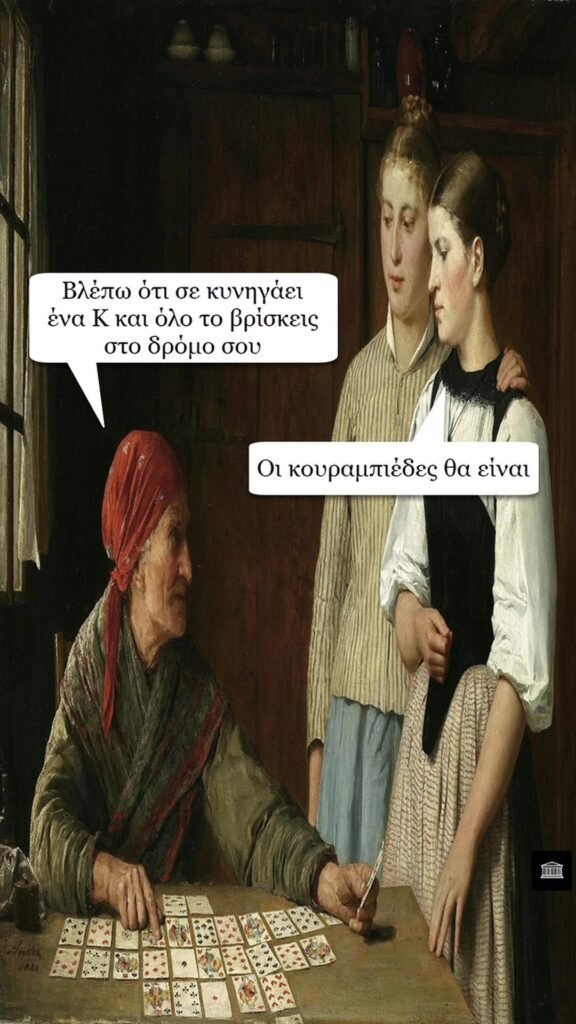Greek humor often thrives on puns, wordplay, and cultural references, combining wit and a touch of absurdity.
The following joke is no exception.

But let’s break it down together.
The Joke
– Βλέπω ότι σε κυνηγάει ένα Κ και όλο το βρίσκεις στο δρόμο σου.
(Vlépo óti se kinigái éna K kai ólo to vrískis sto drómo su.)
I see that the letter K is chasing you, and you keep finding it on your way.
– Οι κουραμπιέδες θα είναι.
(I kurampiédes tha íne.)
It must be the κουραμπιέδες (kurabiedes).
Breaking It Down
Part 1:
“Βλέπω ότι σε κυνηγάει ένα Κ…”
The setup teases the audience by introducing the idea of the letter “K” chasing someone. This personification of the letter is inherently absurd, adding a surreal layer to the joke. It creates a sense of mystery and prompts the listener to wonder, Why is the letter K chasing me?
Part 2:
“…και όλο το βρίσκεις στο δρόμο σου.”
The plot thickens: not only is “K” chasing you, but it keeps appearing in your path. This adds a comical sense of inevitability, making it feel like a persistent (and slightly ridiculous) force in your life.
Part 3:
“Οι κουραμπιέδες θα είναι.”
Here comes the punchline. The “K” isn’t something serious or ominous—it’s κουραμπιέδες, the delicious Greek cookies associated with Christmas. The humor lies in the juxtaposition of the dramatic setup with the silly, unexpected conclusion.
This part works because it resolves the mystery in a way that’s both culturally specific and inherently lighthearted. To a Greek audience, the idea of being “pursued” by κουραμπιέδες is not only absurd but also relatable—they’re everywhere during the holiday season!
Why It’s Funny
- Phonetic Wordplay:
The joke relies on the phonetic connection between “K” and κουραμπιέδες. The sound of the letter immediately makes you think of the cookies, especially during the holiday season when they’re a common treat. - Absurd Imagery:
The thought of cookies chasing someone down the street is ridiculous, which makes it funny. It’s a playful exaggeration of how omnipresent κουραμπιέδες are in Greek households during Christmas. - Cultural Context:
For Greeks, κουραμπιέδες are iconic holiday treats, evoking warmth, family gatherings, and festive cheer. The humor works because it taps into this shared cultural experience. - The Element of Surprise:
The setup makes you think the joke is about something more serious—only to reveal that the “threat” is a beloved cookie. This twist is a classic hallmark of Greek humor.
Tips for Understanding Greek Humor Greek Humor
1. Recognize Word Associations
Greek humor often hinges on the connection between letters, sounds, and words. In this joke:
- The letter “K” leads to κουραμπιέδες because of their shared initial sound.
- Familiarizing yourself with how letters or sounds might evoke everyday items or concepts will help you catch similar puns.
2. Learn Cultural References
To fully appreciate the punchline, it’s helpful to know that κουραμπιέδες are traditional Greek Christmas cookies. Greek jokes frequently draw on shared cultural experiences, so learning about Greek holidays, food, and customs will enhance your understanding of the humor.
3. Understand the Role of Absurdity
Greek humor thrives on absurd and exaggerated scenarios, such as cookies “chasing” someone. The setup might seem dramatic or mysterious, but the resolution is often silly or unexpected. This contrast is key to the humor.
4. Look for Dual Meanings
Many Greek jokes involve phrases or ideas that have both literal and figurative meanings. While this joke doesn’t use a phrase with dual meanings, it plays with expectations, making you think the “K” is something serious—only to reveal it’s something playful (κουραμπιέδες).
5. Embrace the Unexpected
In Greek jokes, the punchline is often unexpected, flipping a dramatic or mysterious setup into something mundane and funny. The humor lies in surprising the listener with an unlikely or absurd explanation.
6. Practice Your Listening Skills
This type of humor requires an ear for nuances in language, especially puns and wordplay. Listening to Greek speakers joke around can help you pick up on patterns and get used to the flow of Greek humor.
7. Don’t Be Afraid to Ask
If you don’t understand a joke right away, ask a Greek speaker to explain it! Greeks love discussing their humor, and it’s a great way to learn more about both the language and culture.
8. Have Fun with Food Jokes
Greek humor often revolves around food, as it’s such a central part of Greek culture. From κουραμπιέδες to τυρόπιτες, food jokes are relatable and an easy way to connect with Greek speakers.
Final Thoughts
This joke exemplifies how Greek humor thrives on wordplay, cultural references, and a touch of absurdity. It turns the mundane (holiday cookies) into something unexpectedly hilarious, all while celebrating the shared traditions that unite Greek people.
So, the next time you spot a κουραμπιές, remember—you’re not eating it. It’s chasing you!


